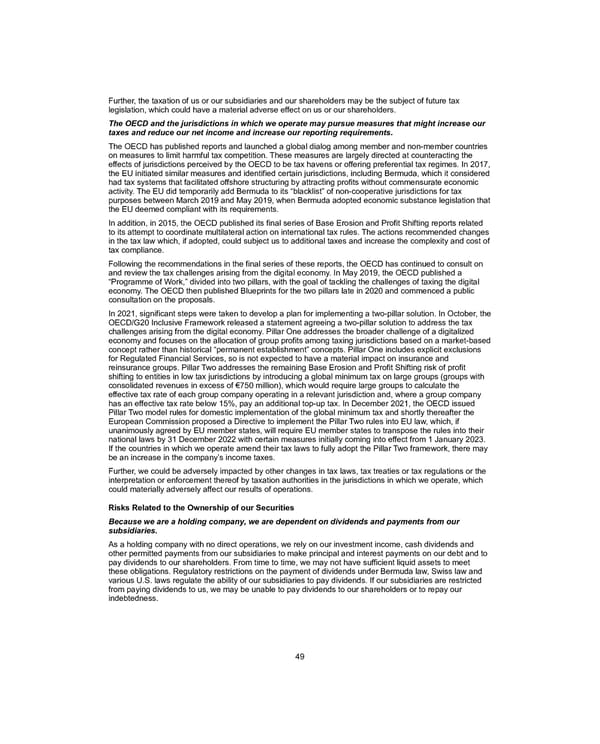Further, the taxation of us or our subsidiaries and our shareholders may be the subject of future tax legislation, which could have a material adverse effect on us or our shareholders. The OECD and the jurisdictions in which we operate may pursue measures that might increase our taxes and reduce our net income and increase our reporting requirements. The OECD has published reports and launched a global dialog among member and non-member countries on measures to limit harmful tax competition. These measures are largely directed at counteracting the effects of jurisdictions perceived by the OECD to be tax havens or offering preferential tax regimes. In 2017, the EU initiated similar measures and identified certain jurisdictions, including Bermuda, which it considered had tax systems that facilitated offshore structuring by attracting profits without commensurate economic activity. The EU did temporarily add Bermuda to its “blacklist” of non-cooperative jurisdictions for tax purposes between March 2019 and May 2019, when Bermuda adopted economic substance legislation that the EU deemed compliant with its requirements. In addition, in 2015, the OECD published its final series of Base Erosion and Profit Shifting reports related to its attempt to coordinate multilateral action on international tax rules. The actions recommended changes in the tax law which, if adopted, could subject us to additional taxes and increase the complexity and cost of tax compliance. Following the recommendations in the final series of these reports, the OECD has continued to consult on and review the tax challenges arising from the digital economy. In May 2019, the OECD published a “Programme of Work,” divided into two pillars, with the goal of tackling the challenges of taxing the digital economy. The OECD then published Blueprints for the two pillars late in 2020 and commenced a public consultation on the proposals. In 2021, significant steps were taken to develop a plan for implementing a two-pillar solution. In October, the OECD/G20 Inclusive Framework released a statement agreeing a two-pillar solution to address the tax challenges arising from the digital economy. Pillar One addresses the broader challenge of a digitalized economy and focuses on the allocation of group profits among taxing jurisdictions based on a market-based concept rather than historical “permanent establishment” concepts. Pillar One includes explicit exclusions for Regulated Financial Services, so is not expected to have a material impact on insurance and reinsurance groups. Pillar Two addresses the remaining Base Erosion and Profit Shifting risk of profit shifting to entities in low tax jurisdictions by introducing a global minimum tax on large groups (groups with consolidated revenues in excess of €750 million), which would require large groups to calculate the effective tax rate of each group company operating in a relevant jurisdiction and, where a group company has an effective tax rate below 15%, pay an additional top-up tax. In December 2021, the OECD issued Pillar Two model rules for domestic implementation of the global minimum tax and shortly thereafter the European Commission proposed a Directive to implement the Pillar Two rules into EU law, which, if unanimously agreed by EU member states, will require EU member states to transpose the rules into their national laws by 31 December 2022 with certain measures initially coming into effect from 1 January 2023. If the countries in which we operate amend their tax laws to fully adopt the Pillar Two framework, there may be an increase in the company’s income taxes. Further, we could be adversely impacted by other changes in tax laws, tax treaties or tax regulations or the interpretation or enforcement thereof by taxation authorities in the jurisdictions in which we operate, which could materially adversely affect our results of operations. Risks Related to the Ownership of our Securities Because we are a holding company, we are dependent on dividends and payments from our subsidiaries. As a holding company with no direct operations, we rely on our investment income, cash dividends and other permitted payments from our subsidiaries to make principal and interest payments on our debt and to pay dividends to our shareholders. From time to time, we may not have sufficient liquid assets to meet these obligations. Regulatory restrictions on the payment of dividends under Bermuda law, Swiss law and various U.S. laws regulate the ability of our subsidiaries to pay dividends. If our subsidiaries are restricted from paying dividends to us, we may be unable to pay dividends to our shareholders or to repay our indebtedness. 49
 2021 Annual Report Page 64 Page 66
2021 Annual Report Page 64 Page 66